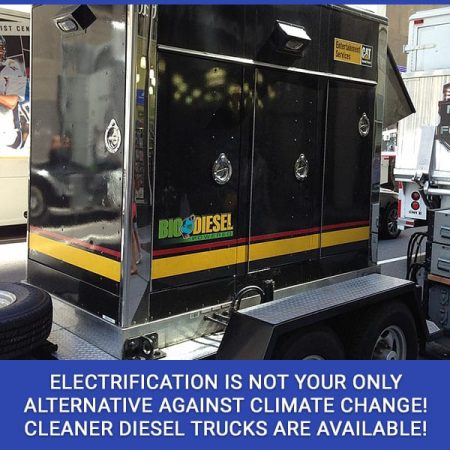 Several out-of-date perspectives are being published about diesel technology such as the one published by an editorial board of Sun-Times. If another analysis of IHS Market data in 2020 is to be believed, around 64% of vehicles belonging to 3-8 class running on the roads of Illinois are using new generation almost-zero emission diesel technology. If you compare this situation to 1992, it will take 60 vehicles of the 2021 model to generate a similar level of emissions as these 1992 models.
Several out-of-date perspectives are being published about diesel technology such as the one published by an editorial board of Sun-Times. If another analysis of IHS Market data in 2020 is to be believed, around 64% of vehicles belonging to 3-8 class running on the roads of Illinois are using new generation almost-zero emission diesel technology. If you compare this situation to 1992, it will take 60 vehicles of the 2021 model to generate a similar level of emissions as these 1992 models.
Using biodiesel
You need to remember that there are independent pickup truck owners out there who illegally modify their trucks and a comparison of them with diesel technology is unfair, to say the least. What is even more surprising is that Sun-Times is advocating electrification and in this process is taking a direct stand against a significant home-grown industry and employers. Keep in mind that Illinois is the 4th largest producer of biodiesel in the U.S. Biodiesel is a low-carbon and renewable fuel that is decreasing the discharges from every diesel engine, new and existing.
No perfect solution is available
Engine and truck makers are creating a range of power train alternatives for their clientele such as hydrogen fuel cells, advanced natural gas, and diesel technology. Although none of these solutions are perfect, neither is electrification. Even today 40% of electricity for Illinois comes via natural gas and coal. Therefore the overall emissions from electrical trucks are unlikely to be zero. It will also need a considerable amount of state investment for infrastructure and incentives for buying such vehicles. The future of diesel technology continues to look safe as analysts agree that it will remain the dominant technology for trucks during upcoming years.
Need to make a steady progress
Everyone agrees that tackling climate change is a massive challenge but there isn’t a single perfect solution available. Everybody will value a reduction in greenhouse gas and other such emissions in whatever way possible, however with open eyes. One should not make a case with older and outdated perspectives. Till the all-electric future of vehicles can be realized there is a need to make a steady ground. A greater advantage to the state lies in the generation of more diesel trucks that will hit the state roads and will extend the use of renewable fuel.
Search for alternatives
This search for finding out alternative fuel for a diesel engine is motivated by various other factors as well. But two main motivations for this search remain a need for vehicle makers to meet emission standards set by state governments and secondly a desire by different truck owners to save money. For most jurisdictions, new engine makers and equipment have to comply with various regulations for limiting pollutant emissions. In many cases, they have to meet greenhouse gas emission and fuel economy limits as well. With these limits becoming more and more challenging to meet, you can observe a significant rise in the cost of additional hardware required to be supplied to your diesel engine.
For maintaining this rise in equipment cost to a minimal value, vehicle makers may consider other power plant technologies. For instance, for non-road equipment machines, we have seen a rise in the use of gasoline SI engines because of the introduction of tier 4 regulations about final emissions. Most equipment owners will be primarily concerned about keeping the costing down.
All said and done these diesel generators will continue to be a major resource for power in the U.S. If you are looking for more information about diesel fuel and its alternatives in Central Florida you can get in touch with Mid Florida Diesel. They have a range of experienced experts with answers.
Picture Credit: Wikipedia
